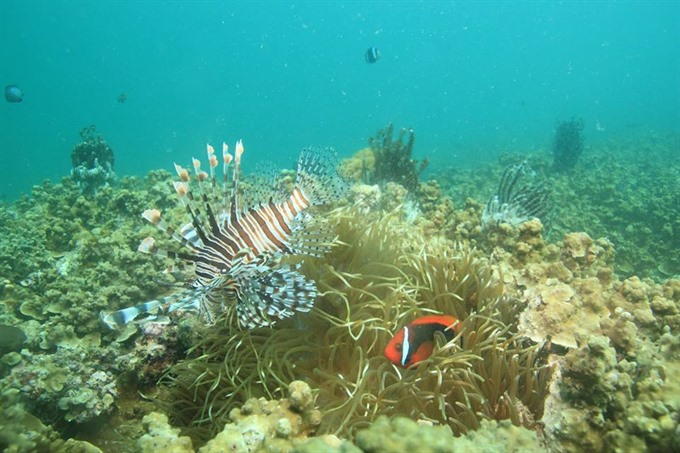Coral reefs restored off Cham Island
Coral reefs have been revived on an area of 2,000sq.m in water off the Cham Island Maritime Protected Area (MPA) after a pilot project that ran from 2015 - 2017.
| A group of coral reef in waters off Cham Island. Some 2,000sq.m coral reefs were replanted in the area in 2015-17. — Photo courtesy Le Xuan Ai |
An expert from the MPA management board, Le Xuan Ai said more than 2,700 groups of coral species had been planted at 10 sites off Bac and Tra beaches.
The coral groups have developed with a survival ratio ranging between 52 and 99%.
“It’s a positive signal that the sea environment around the island has been well improved and protected over past two decades by the MPA and local community,” Ai said.
 |
| Coral reefs shelter fish and aquatic species as well as protect Cham Island from damage by natural disasters. — Photo courtesy Le Xuan Ai |
“We measured that coral groups grew from 2.4cm to 6cm each year after replanting in the strict protected sea areas off Bo and Nam beaches. The coral reef restoration project also involved the participation of tourism businesses, fishermen and local community in the Cham Islands over past years,” Ai said.
He said campaigns against the use of plastic bags by the Cham Island MPA and local authorities as well as and the 3-R (reduce, reuse and recycle) programmes run since 2011 had helped eased pollution.
The rapid restoration of coral reefs will shelter fish and aquatic species and protect the island from damage by natural disasters.
 |
| A rare clownfish is found in coral reefs off the Cham Island. — Photo courtesy Le Xuan Ai |
In a field survey in waters off the island in 2017, scientists and researchers from MPA found the appearance of six rare clown fish species in Viet Nam living in coral reefs.
Scientists from MPA said 29 clownfish species, of which seven had been identified, are found throughout the world, and seven rare species were found in waters of Viet Nam.
Clownfish is the most hunted sea fish species for aquarium centres in Việt Nam, according to MPA.
The island, 20km off the coast of Hoi An, which was recognised as a World Biosphere Reserve in 2009, is one of few places in Việt Nam successfully campaigning against plastic bags and promoting 3-R programmes.
| Tomato clone fish species live in coral reefs. — Photo courtesy Le Xuan Ai |
The 3,000 inhabitants of the islands, which include eight islets with vast ecological diversity, hosted more than 400,000 tourists last year.
The reserve covers more than 33,000ha, including 1,500ha of tropical forests and 6,700ha of sea, featuring a wide range of marine fauna and flora.
(Source: VNS)